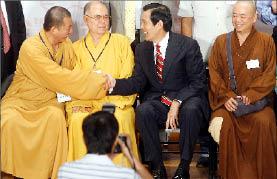President Ma Ying-jeou (馬英九) yesterday touted his love for Taiwan and his efforts to secure the nation’s sovereignty, insisting that his proposed peace agreement with China is aimed at establishing long-term cross-strait peace.
In an interview with the talk show Report to the Voters on CTV, Ma bemoaned the Democratic Progressive Party’s (DPP) continuous challenges over his pro-China stance following his recent proposal to sign a peace agreement with China, saying that he should not carry “original sin” just because his parents came from China.
“Your hometown is where you bury your family members. My grandparents, my father and my uncle are buried here. I love Taiwan deeply because Taiwan is my home and no one should doubt my love for Taiwan,” he said.

Photo: CNA
Discussing his cross-strait policies in the hour-long interview, Ma reiterated that key to his proposed peace pact is systemizing the “status quo” across the Taiwan Strait.
The two sides of the Strait maintain the “status quo” of the “three noes” — no unification, no independence and no use of force — and the proposed peace agreement was based on the principle of “no use of force,” Ma said.
He insisted that former presidents Lee Teng-hui (李登輝) and Chen Shui-bian (陳水扁), as well as DPP Chairperson Tsai Ing-wen (蔡英文), had proposed similar mechanisms to maintain cross-strait peace and his efforts should not be distorted as a move toward unification.
“We will be extremely cautious when promoting any of the policies mentioned in my ‘golden decade’ visions and, as I said, the government will not promote a peace pact without domestic support,” he said.
Domestic support for the peace pact would be determined through a referendum, he said.
Ma added that if he is re-elected in January’s presidential election, he would not take the victory as support for his proposed peace agreement, and he dismissed concerns that the Ma camp is attempting to turn the presidential election into a peace agreement referendum.
Signing a peace agreement with China was one of the proposals Ma outlined for what he called a “golden decade,” one of the pillars of his re-election campaign platform.
When asked about the time frame for signing a peace agreement with China, the president said it was unlikely that a cross-strait peace pact could be promoted during his second term, if he is re-elected, as the nation is still living in a bipartisan political environment.
“However, as the president of the nation, I need to consider the future of our next generations and be prepared for the issues the nation will face in the next decade, including long-term peace across the Taiwan Strait,” he said.
He also dismissed the DPP’s criticisms of his golden decade visions as a “one-man decision” and said that the contents of the visions were presented only after cross-departmental discussions.

CHANGING LANDSCAPE: Many of the part-time programs for educators were no longer needed, as many teachers obtain a graduate degree before joining the workforce, experts said Taiwanese universities this year canceled 86 programs, Ministry of Education data showed, with educators attributing the closures to the nation’s low birthrate as well as shifting trends. Fifty-three of the shuttered programs were part-time postgraduate degree programs, about 62 percent of the total, the most in the past five years, the data showed. National Taiwan Normal University (NTNU) discontinued the most part-time master’s programs, at 16: chemistry, life science, earth science, physics, fine arts, music, special education, health promotion and health education, educational psychology and counseling, education, design, Chinese as a second language, library and information sciences, mechatronics engineering, history, physical education

The Chinese military has boosted its capability to fight at a high tempo using the element of surprise and new technology, the Ministry of National Defense said in the Quadrennial Defense Review (QDR) published on Monday last week. The ministry highlighted Chinese People’s Liberation Army (PLA) developments showing significant changes in Beijing’s strategy for war on Taiwan. The PLA has made significant headway in building capabilities for all-weather, multi-domain intelligence, surveillance, operational control and a joint air-sea blockade against Taiwan’s lines of communication, it said. The PLA has also improved its capabilities in direct amphibious assault operations aimed at seizing strategically important beaches,

New Taipei City prosecutors have indicted a cram school teacher in Sinjhuang District (新莊) for allegedly soliciting sexual acts from female students under the age of 18 three times in exchange for cash payments. The man, surnamed Su (蘇), committed two offenses in 2023 and one last year, the New Taipei District Prosecutors’ Office said. The office in recent days indicted Su for contraventions of the Child and Youth Sexual Exploitation Prevention Act (兒童及少年性剝削防制條例), which prohibits "engaging in sexual intercourse or lewd acts with a minor over the age of 16, but under the age of 18 in exchange for

The High Prosecutors’ Office yesterday withdrew an appeal against the acquittal of a former bank manager 22 years after his death, marking Taiwan’s first instance of prosecutors rendering posthumous justice to a wrongfully convicted defendant. Chu Ching-en (諸慶恩) — formerly a manager at the Taipei branch of BNP Paribas — was in 1999 accused by Weng Mao-chung (翁茂鍾), then-president of Chia Her Industrial Co, of forging a request for a fixed deposit of US$10 million by I-Hwa Industrial Co, a subsidiary of Chia Her, which was used as collateral. Chu was ruled not guilty in the first trial, but was found guilty